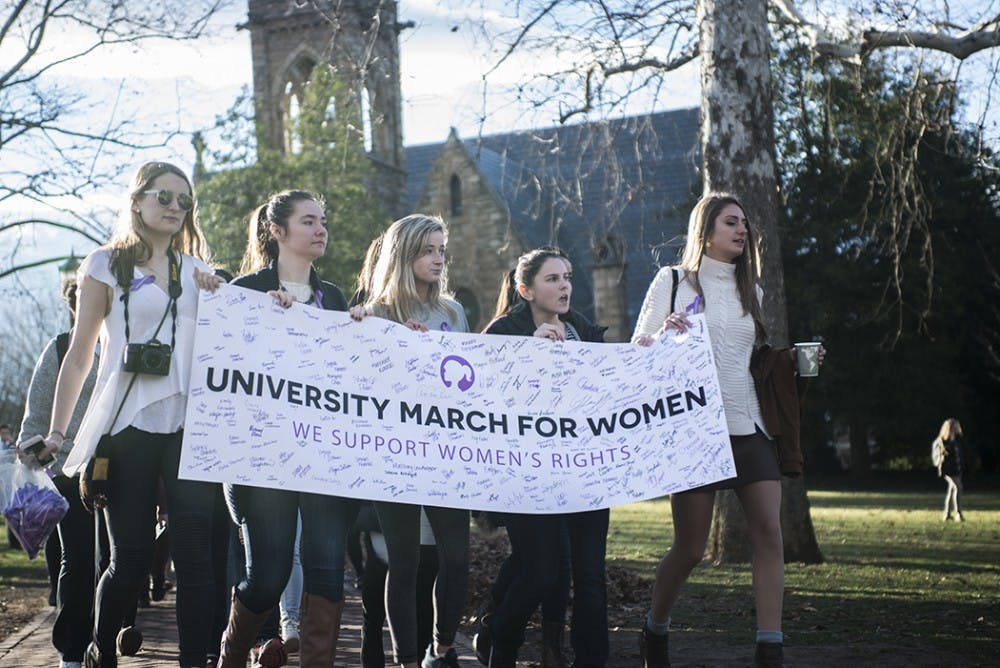The Inter-Sorority Council held a University March for Women Tuesday to bring together the University community in support of women’s rights.
Over 250 University students gathered together to demonstrate their support. The Office of Fraternity and Sorority Life offered hot chocolate, sweets and purple pins which were inscribed with “I Support Women’s Rights” to participants.
The ISC created a banner with a similar inscription held at the forefront of the march and covered in the signatures of those taking part.
The supporters marched from Newcomb Hall to Beta Bridge on Rugby Road and finished on the steps of the Rotunda.
ISC President Rory Finnegan, a third-year College student, said the idea for the march came from a brainstorming session held by the outgoing ISC Cabinet.
“The national march aligns with the ISC’s mission and ideals, including sisterhood, service and support,” Finnegan said in an email statement. “We want to promote a sense of inclusivity and support of women’s rights here on our Grounds in a way that includes all members of the community.”
University March for Women finishing up in front of the Rotunda pic.twitter.com/9mHtq0vTgr
— The Cavalier Daily (@cavalierdaily) January 24, 2017
The March was not held Jan. 21 — the same day as the Women’s March on Washington — due to conflicts with the ISC’s formal recruitment schedule, which had been finalized last winter.
After hearing in November about the Washington march, ISC representatives, chairs and presidents took part in a vote to change the schedule.
“The vote was overwhelmingly in favor of not moving the schedule,” Finnegan said. “Instead, there was a large majority in favor of holding an alternative march on Grounds that would allow those who couldn’t make it to the Washington march, for recruitment or other reasons, to also show support.”
The march was co-sponsored by other organizations on Grounds including the four class councils, the University Women’s Center, the Multicultural Greek Council, Delta Sigma Theta and Zeta Phi Beta.
President of the Class of 2019 Floyd Black, a second-year College student, supported the march and said he had run his own election campaign on the theme of inclusivity.
“I ran on the premise of trying to involve the entire class and in the climate of this year’s election I thought it would be good to show that we support our women, we support our minorities,” Black said. “We just want the best for them as well and I thought this would be a good way to show it.”
On the University March for Women’s Facebook page, the prospect of bringing signs, political ones in particular, had been a source of contention.
Other than the main banner that participants could sign, only a few posters were spotted at the march — contrasting with the seas of signs photographed at the national event.
Marchers could sign a banner, although a few carried their own posters as well pic.twitter.com/PoFvEbwY0H
— The Cavalier Daily (@cavalierdaily) January 24, 2017
Finnegan said the ISC community itself is made up of diverse political perspectives. In order for the march to be as inclusive as possible, she said the ISC did not want to bring strong political views to the march as these could be alienating.
Abby Pelko, director of the University Women’s Center, echoed Finnegan’s words after finishing the march and only having seen a couple of signs.
“My understanding is that they were, the organizers, looking to adhere to the spirit of the march in Washington, but also doing some hard work of being a non-partisan organisation,” Pelko said.
Stephanie Landas, a first-year College student, said she felt it was important to participate for self-growth reasons.
“Even though I am just a white woman, I’d like to hopefully better myself by learning new things from a women’s march,” Landas said.
Pelko said for many of the march’s participants, it seemed as though this was the first time they had been able to participate in a protest like this.
“It is very easy to share things on Facebook and like them and sign a quick petition,” Pelko said. “But to actually put your body out there where what they’re talking about is happening takes a lot more effort and so I was really pleased to see how many people were able to do that today.”
After the march, Finnegan said she thinks many of those who marched left feeling empowered.
“I’m really happy about how it went, and hope that the spirit of inclusivity and equality exhibited today won’t stop with just one march,” Finnegan said.







